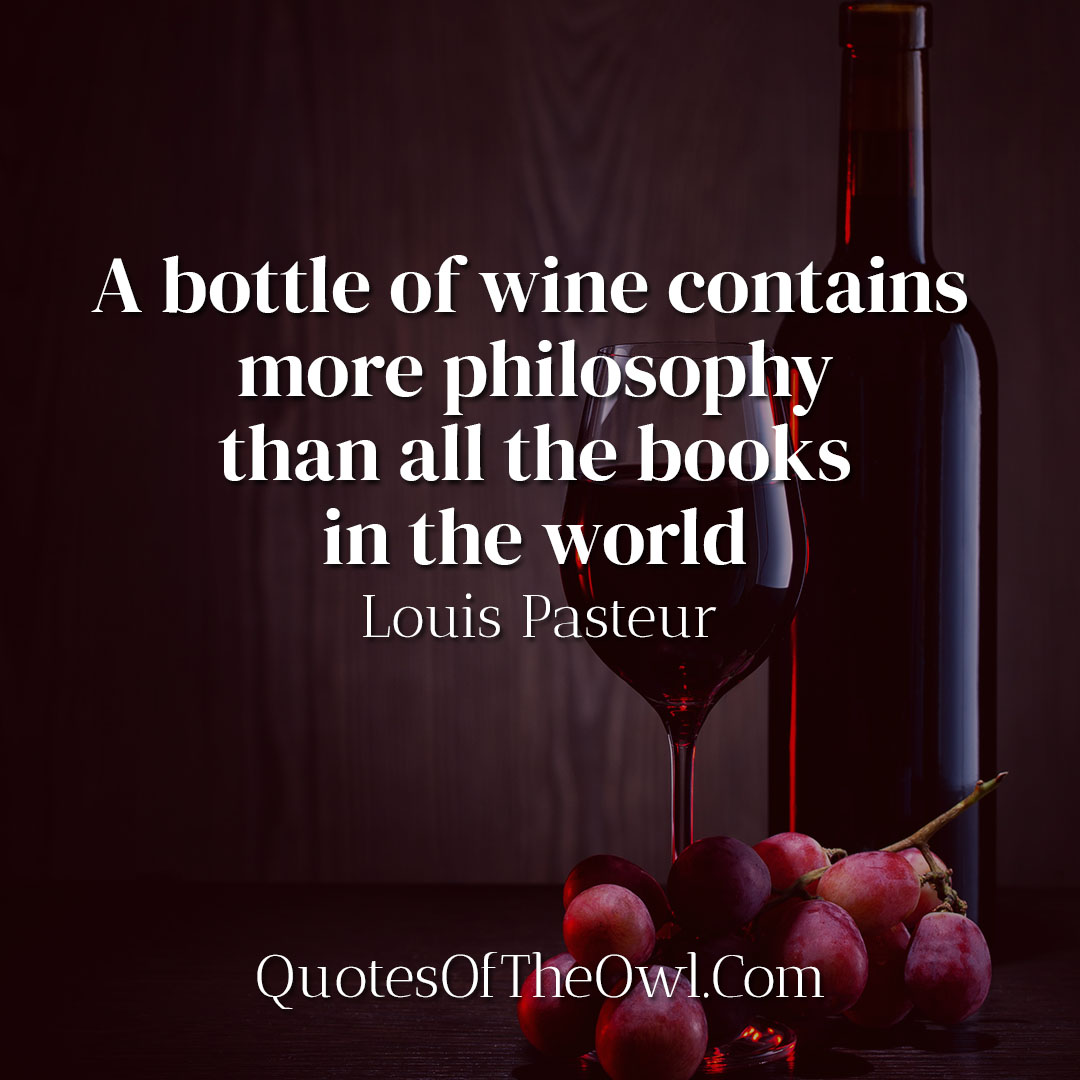What is the meaning behind Louis Pasteur’s Quote ‘A bottle of wine contains more philosophy than all the books in the world’?
Louis Pasteur, a renowned French scientist, once famously stated, “A bottle of wine contains more philosophy than all the books in the world.” This thought-provoking quote encapsulates the depth and complexity hidden within a simple bottle of wine. Beyond its flavors and aromas, wine has the ability to inspire contemplation, introspection, and intellectual discourse. In this article, we will explore the meaning behind Pasteur’s quote and unravel the profound connection between wine and philosophy.
Introduction
Wine has always held a special place in human culture, often associated with celebrations, refinement, and conviviality. As we delve into the significance of Pasteur’s quote, it is essential to understand the context in which it emerged. Let us begin by exploring the life and contributions of Louis Pasteur himself.
Louis Pasteur, born in 1822, was a French chemist and microbiologist who made significant advancements in the fields of medicine and biology. He is best known for his groundbreaking discoveries on vaccination, pasteurization, and microbial fermentation. Pasteur’s work revolutionized the understanding of infectious diseases and paved the way for numerous scientific breakthroughs.
The Context of the Quote
While Pasteur is primarily celebrated for his scientific achievements, his statement regarding wine reflects a different facet of his thinking. It is believed that Pasteur made this observation during a period when he was deeply engaged in contemplating life’s complexities and the broader implications of his scientific inquiries. This context sheds light on the profound connection he perceived between wine and philosophy.
Recommended Book: The Value of Believing in Yourself – The Story of Louis Pasteur by Spencer Johnson and Steve Pileggi
Wine as a Symbol of Culture and History
Wine has played a central role in human culture for thousands of years. It has been an emblem of celebration, refinement, and social connection across civilizations. The significance of wine extends beyond its taste and intoxicating properties. It embodies the essence of history, representing the traditions, techniques, and tales of generations past.
Philosophy and Wine
Wine has long been intertwined with philosophical discussions. Sharing a bottle of wine can evoke intellectual curiosity, stimulating conversations that transcend the ordinary. The act of enjoying wine creates an atmosphere conducive to deep thinking. Moreover, it allows individuals to ponder life’s fundamental questions and explore existential realms.
The Depth of Wine Appreciation
One of the reasons wine is often regarded as philosophical is its inherent complexity. Each bottle encapsulates a unique story shaped by the vineyard, the winemaker, and the grapes themselves. Wine enthusiasts learn to appreciate the intricate details, nuances of flavor, and the artistry behind its creation. By delving into the world of wine, one can embark on a journey of sensory exploration and unravel the rich tapestry it holds.
Wine as an Expression of Terroir
Terroir, a term commonly associated with wine, encompasses the environmental factors that influence a wine’s character. It includes elements such as soil composition, climate, and vineyard location. The concept of terroir emphasizes the interconnectedness between the natural world and the expression of wine. When contemplating wine from a philosophical perspective, understanding terroir becomes paramount in appreciating the profound connection between the land, the grape, and the resulting libation.
Wine and Intellectual Discourse
Throughout history, wine has acted as a catalyst for intellectual discourse and served as a muse for great minds. From ancient Greek symposiums to modern-day salon gatherings, wine has fostered the exchange of ideas and the exploration of philosophical concepts. In an informal and convivial setting, the inhibitions are lowered, and individuals feel more inclined to engage in profound conversations while sipping their favorite vintage.
Wine and the Art of Slow Living
In today’s fast-paced world, wine can serve as a gentle reminder to slow down and savor the moment. The act of opening a bottle, allowing it to breathe, and thoughtfully sipping each glass encourages mindfulness and appreciation for the present. Similar to how philosophical inquiry requires time and introspection, wine encourages us to embrace the art of slow living, appreciating life’s finer details.
Wine and Personal Reflection
Wine possesses a unique ability to evoke personal reflection. Its flavors, aromas, and the memories associated with each sip can transport us to different times and places. By engaging with wine on a deeper level, individuals often find themselves contemplating their own existence, recalling cherished memories, and pondering life’s purpose.
Conclusion
In conclusion, Louis Pasteur’s quote, “A bottle of wine contains more philosophy than all the books in the world,” encapsulates the profound connection between wine and philosophy. Beyond its role as a simple beverage, wine represents a convergence of culture, history, and intellectual stimulation. By appreciating wine’s complexity and engaging in philosophical discussions, one can embark on a journey that transcends the boundaries of ordinary existence.

